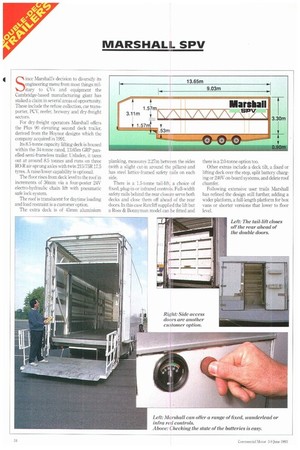MARSHALL SPV
Page 36

If you've noticed an error in this article please click here to report it so we can fix it.
Since Marshall's decision to diversify its engineering menu from most things military to CVs and equipment the Cambridge-based manufacturing giant has staked a claim in several areas of opportunity These include the refuse collection, car transporter, PCV, reefer, brewery and dry-freight sectors.
For dry-freight operators Marshall offers the Plus 90 elevating second deck trailer, derived from the Hoynor designs which the company acquired in 1991.
Its 8.5-tonne capacity lifting deck is housed within the 34-tonne rated, 13.65m GRP panelled semi-frameless trailer. Unladen, it tares out at around 8.5 tonnes and runs on three RO-R air-sprung axles with twin 215/75R 17.5 tyres. A raise lower capability is optional.
The floor rises from deck level to the roof in increments of 36mm via a four-poster 24V electro-hydraulic chain lift with pneumatic safe lock system.
The roof is translucent for daytime loading and load restraint is a customer option.
The extra deck is of 45mm aluminium planking, measures 2.27m between the sides (with a slight cut-in around the pillars) and has steel lattice-framed safety rails on each side.
There is a 1.5-tonne tail-lift, a choice of fixed, plug-in or infrared controls. Full-width safety rails behind the rear closure serve both decks and close them off ahead of the rear doors. In this case Ratcliff supplied the lift but a Ross & Bonnyman model can be fitted and there is a 2.0-tonne option too.
Other extras include a deck tilt, a fixed or lifting deck over the step, split battery charging or 240V on-board systems, and delete roof chamfer.
Following extensive user trails Marshall has refined the design still further, adding a wider platform, a full-length platform for box vans or shorter versions that lower to floor level.




















































































